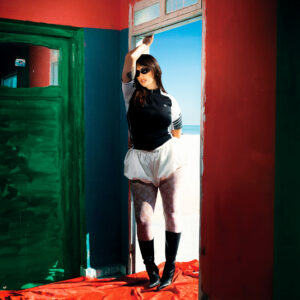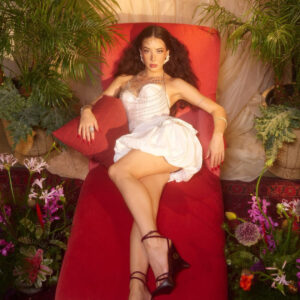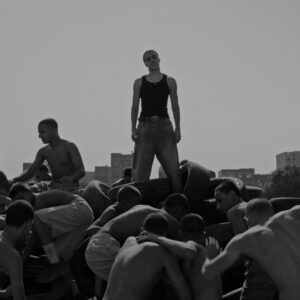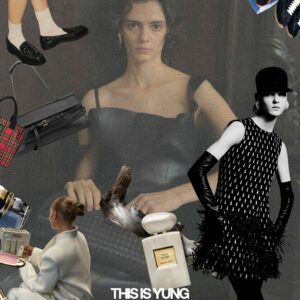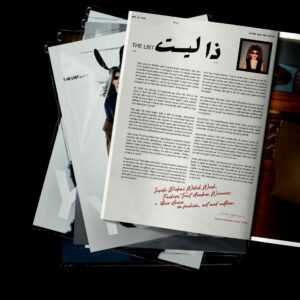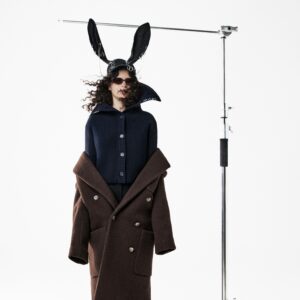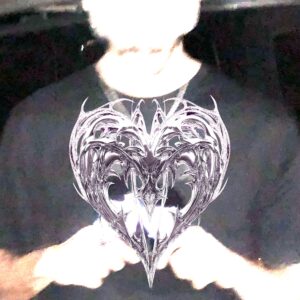With some 18 years of experience in the music industry and more than 200 shows across Europe with his synth-rock ensemble “Who Killed Bruce Lee” under his belt, Wassim Bou Malham has weathered the music indusry’s peaks and valleys, even organising countless club nights at some of the biggest venues across the Middle East with Lebanese nightlife moguls Factory People. Yet, even during the height of all these successes and continuous milestones, he felt something was still missing. Although born and raised in Lebanon, he grew up with his ears tuned to the sounds of the West; his early musical influences were dominated by English-speaking bands and artists, given the scant presence of alternative Lebanese and Arabic music culture back then.
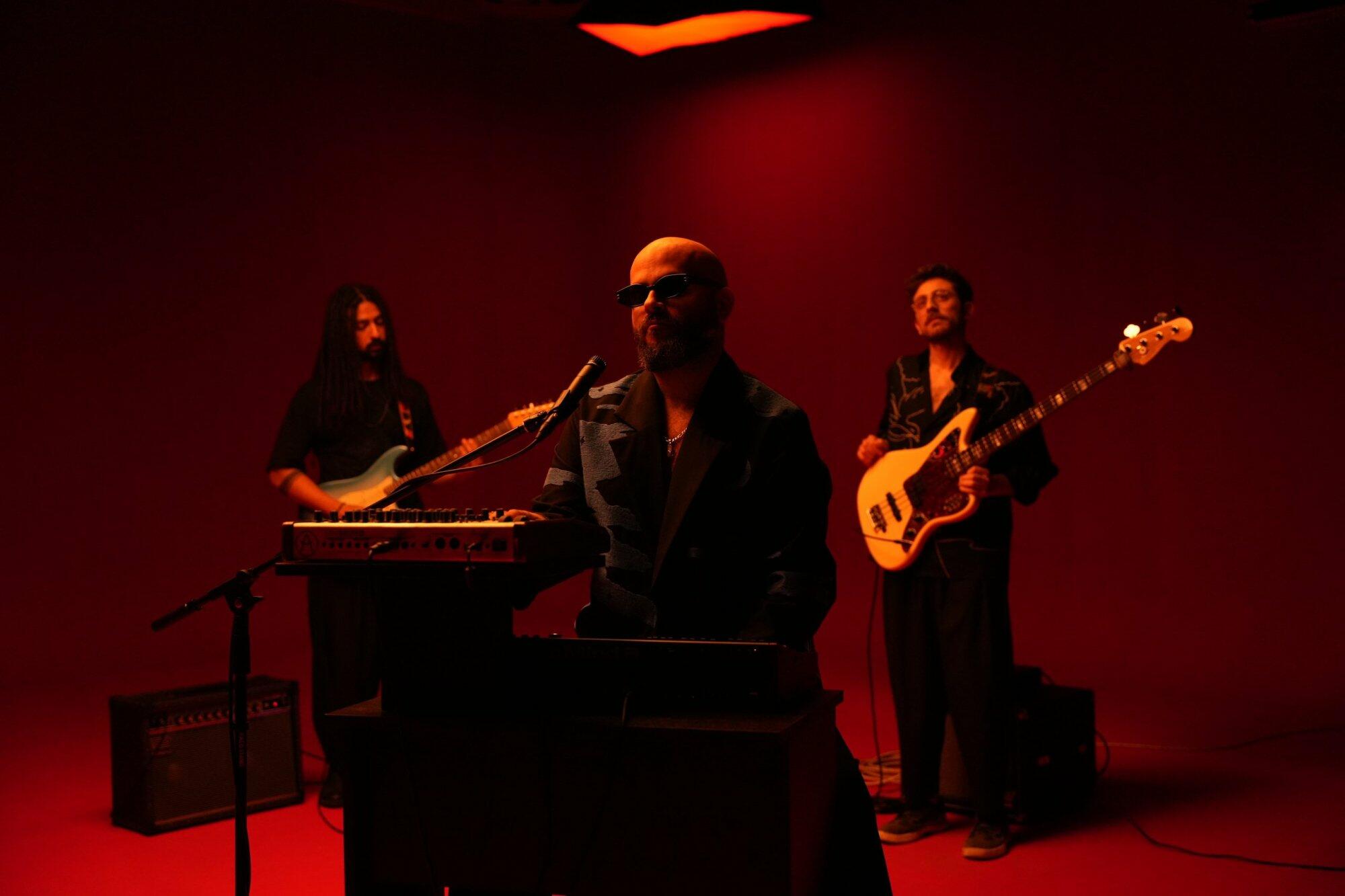
He’s been living out his wildest rock star dreams, yet singing in English for almost a decade left him longing for something more. There was so much left undone in terms of Arabic music for him, for his younger self, and for the future generations of musicians to come. So, he decided to try his hand at singing in his mother tongue. He recalled, “I set out on a journey to create the sound that I always wanted to find as a kid. When I was growing up in my teens, there was only commercial Arabic music in our region. Maybe that’s why I gravitated towards MTV Music and bands like Nirvana.”
In a way, Bou Malham is now making the kind of music he wished he could have heard growing up, reimagining how Arabic music might have evolved with global artistic liberty.
Over the past four years, he has begun crafting the music of his childhood daydreams, rekindling his love for the Arabic language and weaving together disparate sounds to create something entirely new. “It was a multi-year exercise of understanding the roots and theory of Arabic music. I went back to school in a way and started again practicing lyric writing, this time completely in Arabic”, he says. During this transformative period, Bou Malham delved into the depths of Arabic music, exploring vocal techniques, rhythmic patterns, and melodies to grasp their historical and cultural significance. He devoted himself to honing his skills as a lyricist, seeking to create a unique musical expression that resonated with his artistic vision, saying, “I was always poetic when it came to my lyricism and I wanted to also find the same space within the Arabic language, I decided to write in a local dialect.”
Finding the perfect harmony between Arabic melodies and lyricism proved to be a challenge. “How do you sing Arabic lyrics without it sounding folkloric?” he wondered. He sought to infuse contemporary sensibilities into the rich tapestry of Arabic music traditions, hoping for an output that avoided cheesiness and clichés.
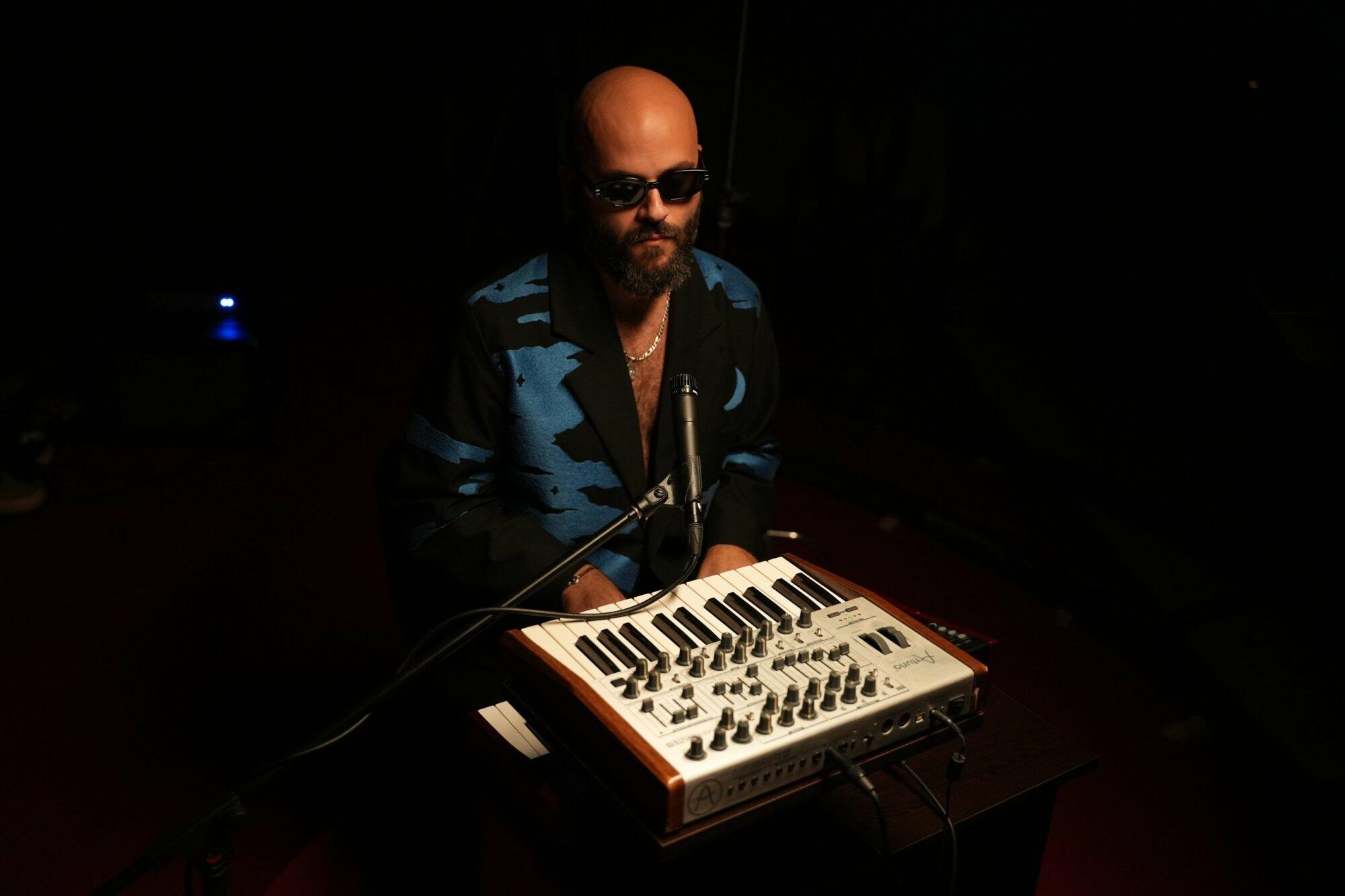
Driven by his poetic inclination and a desire to carve his niche in the alternative Arabic music scene, Bou Malham sought out to discover the “sound of his generation.” The result was Gharam Electric (Spotify)—a project that seamlessly melds funk, jazz, electronic, hip-hop, and R&B aesthetics with emotive Arabic lyrics. Based in Beirut, Lebanon, Gharam Electric hopes to offer a fresh take on Arabic music, eschewing exoticism and folkloric aesthetics for something unpretentiously fun and well, real.
Bou Malham’s vision is manifesting in the self-titled 9-track LP, “Gharam Electric”, which he has been slowly releasing in tantalizing little bits and parts. The vocals, synth and guitars are all performed and recorded by hi, with the help of some of the best instrumentalists from the region, and is co-produced with esteemed Arab producer Sofyann Ben Youssef. The album’s production was flawlessly curated by Ammar 808, with Ziad Mouka as the recording engineer. Collaborating with Nidal, Abdo Samwa, Charbel Sawma, and Rami Abou Khalil, Bou Malham brought together a talented ensemble to create this masterpiece.
In the first music video from Gharam Electric, “Kullou Banat,” Bou Malham shows off his ingenious approach to music-making. Hacking his analog synths to play quarter tones, he crafts a dreamy neo-soul, lo-fi soundscape that embraces the melodic use of the Arabic maqam. Lyrically, it is a fantasy about falling in love with all the Arab women of the world. However, Wassim emphasizes that he isn’t referring to strength or liberalism, but rather to the essence of authenticity. He clarifies, “What I mean by authentic is an Arab woman that wants to be whatever she wants to be. She can be a fully empowered sex icon out there, or she can be a person that is more conservative.” He is in love with the sense of pride that comes with being an Arab woman. “She can be whatever she wants to be, as long as she’s true to herself. As long as she’s true to what makes her human, a woman, whatever. As long as she’s really making sure that she’s empowering herself and not compromising on anything she wants,” he says.
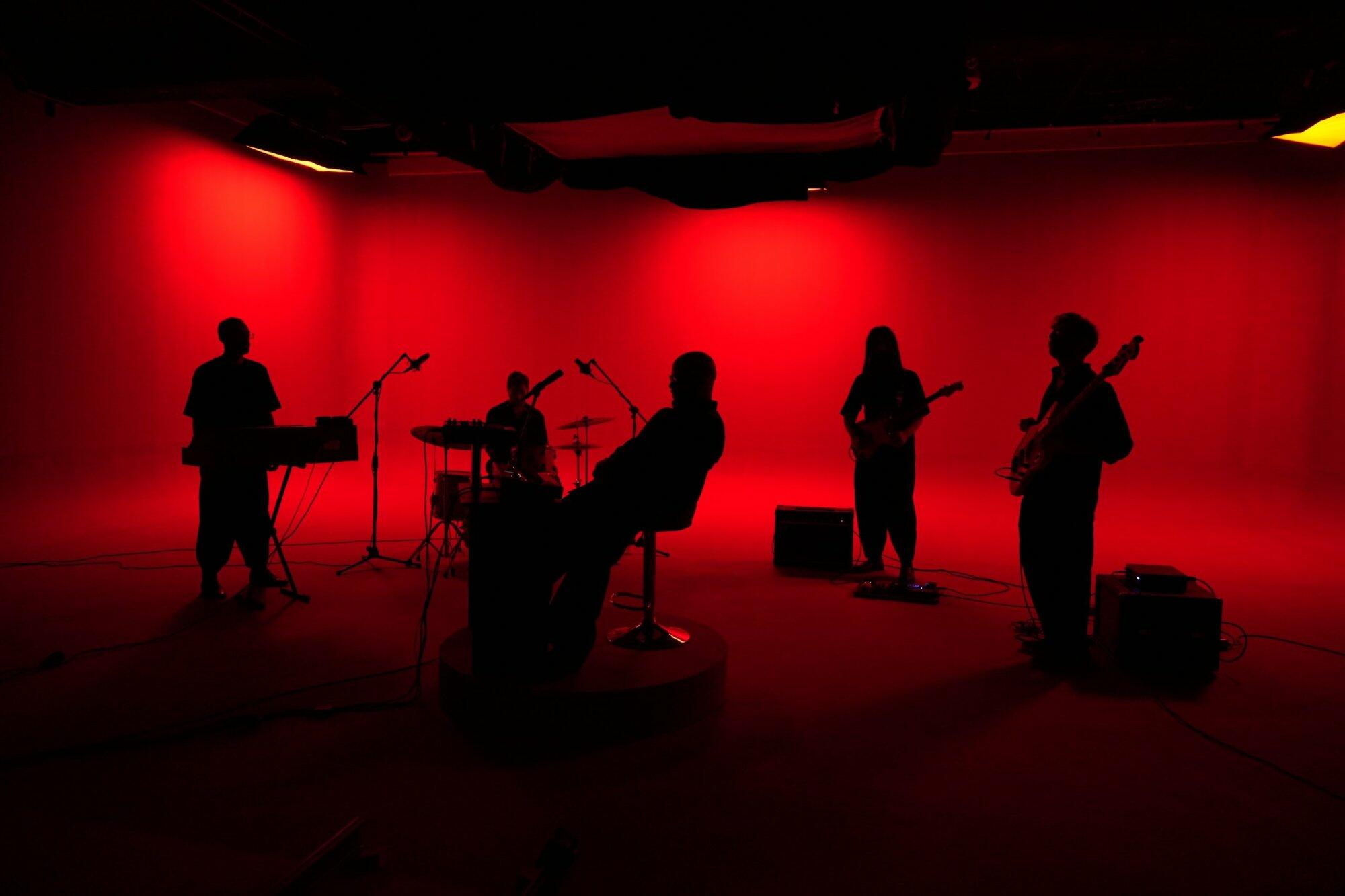
But Bou Malham doesn’t really want to make a statement here. “Can’t we just visualize a mood? Do we have to have a narrative? Or do they have to have storytelling?” he questions with a tinge of frustration colouring his tone. He just wants to create art for the sake of art itself, liberated from the confines of any predetermined storylines. “I think that we have beautiful aesthetics in the Arab world. Sometimes we miss on pushing them to the forefront of the screen because we’re a bit more engulfed in the idea of “What’s the narrative?”,” he says.
Wassim Bou Malham aspires to leave space for imagination and interpretation, allowing the audience to create their own connections and meanings. “We need to give more space for that. When we tell a specific story about a specific subject, you’re really eradicating any kind of dream capabilities.” He views music and all forms of art as open-ended questions, inviting personal exploration and reflection, “That’s always been the point, from poetry to art, isn’t that what it is? How you interpret it?” he asks.
The visual aspects of the music video for “Kullou Banat,” serve as an atmospheric backdrop, enabling the audience to immerse themselves in a sensory experience, as they float in a sea of ambient lighting. It’s a sea on which the imagination can roam free, with the mood further set by Lebanese designer Salim Azzam’s impeccable styling and its cosmopolitan allure. The video is an intimate portrayal of the band in their truest element. “You’re seeing the artists in their element, playing the music, versus a short film telling a certain story about a certain narrative. So less narrative, more beautiful aesthetics, that’s the visual direction of the project,” says Bou Malham.
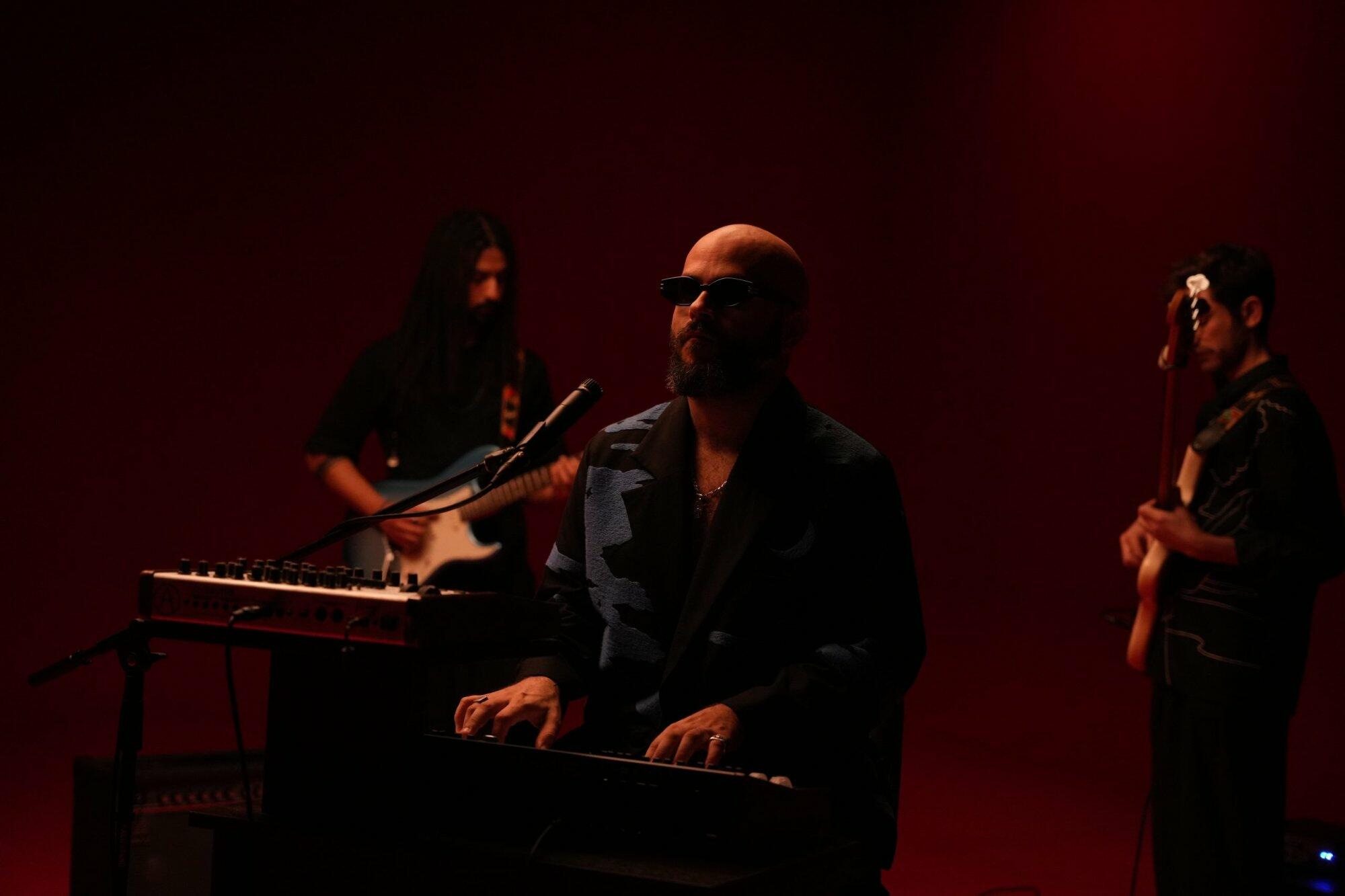
The video gives off the same vibe as the music itself—sensuality, tension, and vibrant colours. It’s a cohesive fusion of auditory and visual elements. “I wanted the music video to be the same mood that you’re getting sonically, some heat some sexual tension, some innuendo, and the colours. That’s why I enlisted Azzam to dress us, because I wanted everyone in the band to look their best,” he says.
Bou Malham’s intention with Gharam Electric is to highlight the band’s influence rather than the producer’s, ensuring a human touch and unrestricted feel to the recordings. “That’s the difference I feel between electric direction and every other alternative Arabic direction in the region, because 99% of the direction is mostly producer-vocalist direction or producer-DJ direction. I really want to explore and push for a band-centric direction.” He wants the band’s essence to shine through, too, “I miss seeing a well-rehearsed, incredibly talented band owning the stage.” Bou Malham set his sights on encapsulating that elusive and electrifying synergy in a mesmerizing music video. The video serves as a visual testament to the band’s extraordinary artistry and undeniable presence, delivering a sleek and captivating showcase of their boundless talent.
By infusing Arabic elements into the music, Bou Malham and his band found a unique synergy, creating a beautiful symbiosis. He fondly recalls the young, immensely gifted musicians who joined him in the recording process, primarily inclined towards the neo-soul jazz vibe. “That was where their head was at, but when I came into their lives, and I put the Arabic elements into all of it, they also found like a third degree. So I found the third degree with them. And they also found the third degree with me. It was a beautiful symbiosis,” Bou Malham explains.
Beyond the aesthetics, Bou Malham wanted to capture the electric energy and harmonious symbiosis that occurs when a band plays in perfect sync. “When we are playing our instrument, sometimes we can characterize that as a sexual encounter because it gives us the same feeling. When you’re playing the guitar or the drums, you’re in the pocket and in the groove. It’s the same kind of endorphins when you’re making love,” he says.
In essence, Wassim Bou Malham has an artistic vision for Gharam Electric that encompasses more than just music. It encompasses a multi-sensory journey that stirs the imagination, embraces aesthetics, and celebrates the interplay between artistry and personal interpretation.
Follow YUNG’s Music Page for all the latest drops and more interviews like this with Wassim Bou Malham.
